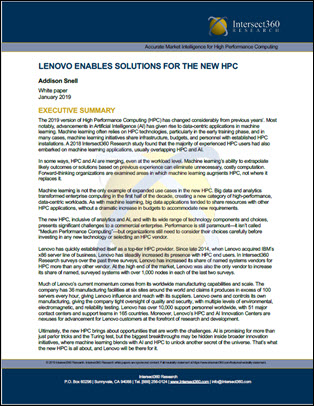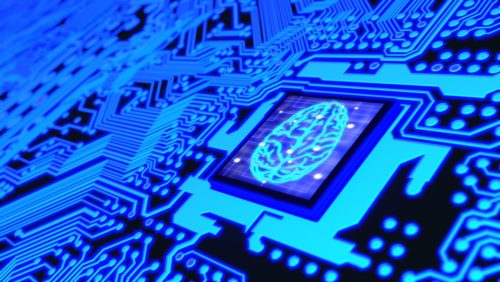Sponsored Post
High performance computing has gone through numerous shifts in the past few years. Many of those in the HPC business and leaders of enterprises with increasingly complex HPC needs know the largest of these shifts have stemmed from advancements in artificial intelligence, spurring the rise of data-based applications in machine learning.

Download the full report.
The domino effect continues, as machine learning often relies on HPC technologies. That’s according to a new white paper from Lenovo that explores how the rise of AI and machine learning is calling for a new wave of HPC solutions.
According to a 2018 Intersect360 Research study cited in the report, the majority of experienced HPC users have also used machine learning applications — often overlapping HPC and AI. According to the report, forward-thinking enterprises are exploring how machine learning augments or compliments HPC, “not where it replaces it.”
And machine learning is just one example of use cases in what Lenovo calls the “new HPC.” Big data and analytics are also transforming the computing landscape, creating far more heavy, data-centric workloads.
The new HPC, inclusive of analytics and AI, and with its wide range of technology components and choices, presents significant challenges to a commercial enterprise.” — Lenovo
Tech companies have been busy creating solutions and systems to meet these new HPC needs. In other words, the scope of HPC workload has not only increased, but also the number of technologies available. For example, big data sparked a new interest in tech for maximum data throughput, and as a result, flash memory solutions have grown in popularity and numbers.
With a significant number of choices available on the market to address enterprises’ HPC needs, it may seem like a straightforward proposition to select the right HPC system for your enterprise. But Lenovo cautions it’s not always that simple.

Lenovo has been growing its HPC business since it purchased IBM’s x86 server line of business in 2014. (Photo: Shutterstock/BeeBright)
Users must carefully consider how to tier, migrate, and archive data for an optimal balance of performance and cost. Applications need to be optimized and possibly ported to take advantage of the computing, storage, and interconnect deployed,” the report states.
Performance is of paramount importance. Lenovo, for example, has been growing its HPC business since it purchased IBM’s x86 server line of business in 2014. In the new whitepaper from Lenovo, the company — who has 36 manufacturing facilities at six sites around the world — outlines it’s own HPC solutions, systems, and history in the market. In 2017, Lenovo introduced a product like named ThinkSystem, based on the new Intel Xeon Scalable Platform. And the company used these releases and more to gain traction with HPC-using organizations.
On top of exploring Lenovo’s enterprise options for HPC, the report also explores how the biggest breaks on the tech horizon might be hidden “where machine learning blends with AI and HPC.”
Download “Lenovo Enables Solutions for the New HPC” to explore the intersection of HPC and AI, as well tips on how to choose the right HPC provider for your enterprise.



